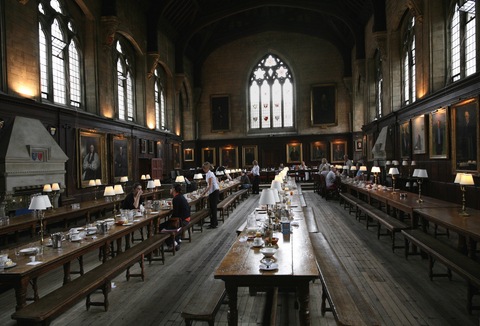|
|
||
|
|
||
 To reach Paul Rainey was only slightly easier than to come into contact with aliens. The geography of his travels in connection with lectures on evolutionary genetics covers America and Europe, plus he spends much time in his island hut (5 hours by boat from Oakland, New Zealand) far from electricity, roads and e-mail. «It’s a wild place, — he says, — you can think there». Why did we address Paul with the request for interview? It was interesting to learn first-hand what it was like to operate an educational institution cellar (Mr Rainey used to run St Cross College wine cellar). Secondly, it is curious to find out, whether he transferred «the Oxford traditions» to his own international laboratory. How do wine and science go together?
To reach Paul Rainey was only slightly easier than to come into contact with aliens. The geography of his travels in connection with lectures on evolutionary genetics covers America and Europe, plus he spends much time in his island hut (5 hours by boat from Oakland, New Zealand) far from electricity, roads and e-mail. «It’s a wild place, — he says, — you can think there». Why did we address Paul with the request for interview? It was interesting to learn first-hand what it was like to operate an educational institution cellar (Mr Rainey used to run St Cross College wine cellar). Secondly, it is curious to find out, whether he transferred «the Oxford traditions» to his own international laboratory. How do wine and science go together?

Does a Wine Steward know the exact picture of how much wine is consumed and is it more or less constant figure?
Most definitely one knows consumption figures. The steward is responsible for all aspects of wine from tasting (and ordering), managing the cellar, stocks, sales, recommendations etc.
Yes, I think consumption is pretty constant
Can a student buy wine directly from cellar? Will it be cheaper than buying it elsewhere? If yes what matters to students?
Yes, and yes. In fact most cellars would sell wine to members of college at cost plus a small margin. This applies to wines that have been in the cellar for some time. A student gets an excellent selection of wine from the college cellar and prices are extremely reasonable.
Is wine popular among students/academics? (taking into account cult of sport and health living as well as multi-national student composition)?
Yes, it would be drunk most days (with food).
Does a Wine Steward arrange wine events like tasting for students? How much it costs? How often they might happen?
Yes, I used to run a tasting each term and would typically theme it around some interesting comparison or region etc. The cost is minimal — just enough to cover the cost of the wine.
Do students and teachers dine together? I read about St John College diners: every night academics and students have dinner sitting at one table, room lit by candles only. Is it true? If yes, how formal is such event?
Colleges differ. My own college St Cross — a graduate college — did not discriminate between students and fellows, but all of the older colleges do. I was a lecturer at Wadham where I experienced the culinary and social delights of that table. Typically ‘high table’ is used by the dons and the students eat in the same dinning hall, but at different tables. After the main meal (an entrée, a main and sweet) fellows retire to the dessert room where fruit, chocolates, nuts etc are consumed along with addition wines. Typically a port, a Sauternes, a Claret, which are passed to the left and circle three times (fellows and their guests help themselves).
In terms of formality: these range from everyday and relatively informal low-key affairs with no dessert room, through highly formal and multi-course / multi-wine events, where dress is indeed black tie!
How did your personal taste for wine develop? And what is wine to you — a muse? relaxation? romantic drink? What are your views on combining wine and scientific work?
I’ve always been interested in wine, but my eyes were opened when I took on the job of wine steward for my college (you have seen the article I wrote about what this entails).
I enjoy wine with food and conversation. Wine and science go just fine!
Does wine play any role at Rainey Lab? I see all of your people come from different parts of the world — maybe you arrange some informal dinners where members of your group socialize?
Indeed, we do do precisely this. We drink wine after the college seminar (once a week) and at dinner afterward; sometimes we open a bottle or two on a Friday afternoon. Wine is kept in our fridge and store room. We also socialize outside work and also celebrate the success of our PhD students upon completion.